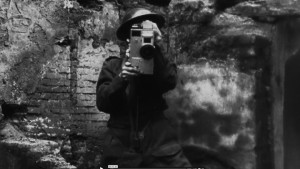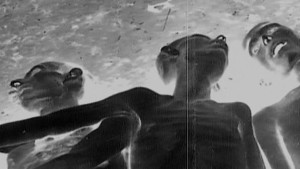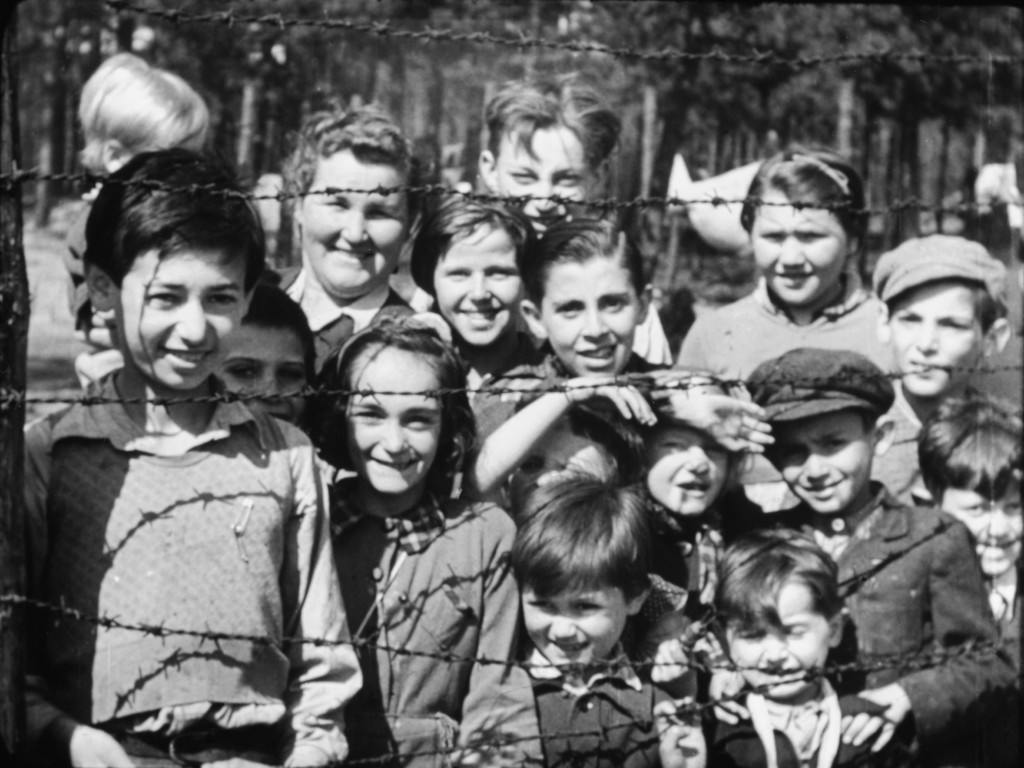By James Knight.
During his legendary conversation with Francois Truffaut, Alfred Hitchcock remarked on the differences between feature and documentary filmmaking, stating that in documentary, god has already created all the elements for the director, whereas in feature filmmaking the director must essentially become his own god and create his own world with its own set of rules and moral codes of judgement. Archival footage from André Singer’s 2014 documentary Night Will Fall shows not a world created by a god, but one destroyed by man. Before working alongside Hitchcock on such films as Rope (1948), Under Capricorn (1949), and I Confess (1953), producer Sidney Bernstein first orchestrated a documentary project that aimed to categorically prove to doubters that the Holocaust actually happened. The film, titled German Concentration Camps Factual Survey combined on the ground footage shot by British, American, and Soviet troops during the liberation of the concentration camps at Auschwitz, Bergen-Belsen, Buchenwald, and Dachau, with at one point Hitchcock himself being brought on board as a supervising director. The film was neither shown nor completed, primarily because the UK government felt it would elicit too much sympathy for the Jewish survivors who at the time desired to seek refuge in either Britain, America, or Palestine, something all three national authorities were far from keen on. The film was shelved. However, thanks to various scholars at London’s Imperial War Museum, the film has been completed, with Singer’s documentary telling the story of this journey of completion, whilst including several minutes of must see footage from Bernstein’s original harrowing film of unabridged human horror.
 After the first few minutes of Night Will Fall, with Helena Bonham Carter’s unemotional and often cold voice over narration, you would be excused to think that it’s just another History Channel-esque TV documentary, but of course you would be wrong. The footage from German Concentration Camps Factual Survey transcends almost any concentration camp footage previously seen. Early on in the film, we’re told of an extraordinary encounter between British and Nazi troops where they both agreed on a temporary cease fire so that fighting could be avoided near the Bergen-Belsen camp that had been overrun with a typhus epidemic. After this brief respite, the true horror begins as the British enter the camp and discover the truth about what has really been going on within Germany. What the archive footage captures brilliantly is the joy of the liberated camp prisoners juxtaposed with the sense of horror from their liberators. As Raye Farr, from the Holocaust Museum in Washington D.C., says about Bernstein’s film, it “felt as if the whole story was there.” We see relief and disbelief plastered across the faces of Polish Jews as they gaze in amazement through the barbed wire of their little hell on earth at the sight of the approaching British soldiers come to free them. Some fall to their knees in front of their liberators, take their hands and weep uncontrollably into them, others refer to them as angels. One Auschwitz survivor describes their Soviet liberators as bringing, “chocolate, cookies, and hugs.” This is all in stark contrast to the soldiers, one of which describes being overcome with the, “stench of death” upon entering a camp. Another American states first discovering the camps was like “peering into hell.” The archival images found in Night Will Fall are so stark in their degradation of humanity it feels that we too can smell that stench of death through our screens.
After the first few minutes of Night Will Fall, with Helena Bonham Carter’s unemotional and often cold voice over narration, you would be excused to think that it’s just another History Channel-esque TV documentary, but of course you would be wrong. The footage from German Concentration Camps Factual Survey transcends almost any concentration camp footage previously seen. Early on in the film, we’re told of an extraordinary encounter between British and Nazi troops where they both agreed on a temporary cease fire so that fighting could be avoided near the Bergen-Belsen camp that had been overrun with a typhus epidemic. After this brief respite, the true horror begins as the British enter the camp and discover the truth about what has really been going on within Germany. What the archive footage captures brilliantly is the joy of the liberated camp prisoners juxtaposed with the sense of horror from their liberators. As Raye Farr, from the Holocaust Museum in Washington D.C., says about Bernstein’s film, it “felt as if the whole story was there.” We see relief and disbelief plastered across the faces of Polish Jews as they gaze in amazement through the barbed wire of their little hell on earth at the sight of the approaching British soldiers come to free them. Some fall to their knees in front of their liberators, take their hands and weep uncontrollably into them, others refer to them as angels. One Auschwitz survivor describes their Soviet liberators as bringing, “chocolate, cookies, and hugs.” This is all in stark contrast to the soldiers, one of which describes being overcome with the, “stench of death” upon entering a camp. Another American states first discovering the camps was like “peering into hell.” The archival images found in Night Will Fall are so stark in their degradation of humanity it feels that we too can smell that stench of death through our screens.
Another piece of footage shows Allied troops discovering large unending stacks of human hair that has been sorted and weighed and precisely filed away. Sorted and weighed. Sorted and weighed. Sorted. And. Weighed. Those words jump off the screen and attack your heart like the words that leap from letters in F.W. Murnau’s City Girl (1930). Later on in the film we follow the original editors of German Concentration Camps Factual Survey as they take us through the film’s original negatives where the blacks are white and the whites are black, making the array of dead bodies photographed look like mummified remains that have long been mistreated, and then long been forgotten. Sometimes, the images are too much to take, but too important to look away from.
 German Concentration Camps Factual Survey, originally a joint US/UK production, was eventually abandoned by the Americans in favour of Billy Wilder’s leaner and more propagandist Death Mills (1945). Toby Haggith of the Imperial War Museum, who appears in Night Will Fall, attacked the Wilder film for lacking in art, claiming it was purely an attack on the German people. When films, whether fiction or documentary, are released with content so obviously poignant as the Holocaust, questions gets raised as to whether these films are above criticism, whether we must treat them differently based purely on their content. The simple answer is no, they are not above criticism, we must treat them just like any other film. Mainly because they aspire to be, or are in fact, art. They are created with filmic purposes using filmic sensibilities, they are not news footage, there is no art in news footage, and more often than not, there is more truth to be found in a film than there is in the news media.
German Concentration Camps Factual Survey, originally a joint US/UK production, was eventually abandoned by the Americans in favour of Billy Wilder’s leaner and more propagandist Death Mills (1945). Toby Haggith of the Imperial War Museum, who appears in Night Will Fall, attacked the Wilder film for lacking in art, claiming it was purely an attack on the German people. When films, whether fiction or documentary, are released with content so obviously poignant as the Holocaust, questions gets raised as to whether these films are above criticism, whether we must treat them differently based purely on their content. The simple answer is no, they are not above criticism, we must treat them just like any other film. Mainly because they aspire to be, or are in fact, art. They are created with filmic purposes using filmic sensibilities, they are not news footage, there is no art in news footage, and more often than not, there is more truth to be found in a film than there is in the news media.
One scene in Night Will Fall shows a British family listening in to Richard Dimbleby’s BBC radio broadcast report concerning the Allies’ first discovery of a concentration camp. The family tries to picture the horrors Dimbleby describes but it’s more than apparent that his words do not do justice to the true reality of the camps. This is in essence why cinema was created. Night Will Fall is a powerful film that future generations will use as a yardstick for what humanity is capable of, as the final line of voice over in German Concentration Camps Factual Survey states, “we who live, will learn.”
James Knight is a film critic residing in Wales, UK.

